Hyundai i20 VS Hyundai i10
In the competitive hatchback segment, the Hyundai i10 and Hyundai i20 each offer distinct advantages tailored to different driver needs. The i10 shines with its compact size and agility, making it an ideal choice for urban environments, while the larger i20 provides enhanced space and features suitable for families and longer journeys. Ultimately, the choice between these two popular models comes down to a balance of practicality and personal preference.
Hyundai i20
The Hyundai i20 impresses with its sleek design and modern aesthetics, making it a stylish choice in the compact car segment. Its interior is thoughtfully designed, offering comfort and advanced technology for a pleasurable driving experience. The vehicle also stands out with its efficient performance and agile handling, making city driving a breeze.
detailsHyundai i10
The Hyundai i10 impresses with its compact design, making it an ideal choice for navigating through busy urban environments. Its interior is surprisingly spacious, offering drivers and passengers comfort beyond what one might expect from a city car. The model combines efficiency and practicality, making it an attractive option for those seeking both economy and functionality in their daily commute.
detailsHyundai i10 vs Hyundai i20: A Comprehensive Comparison
The automotive market has seen a surge in mini and compact vehicles over the years, with Hyundai offering two standout models: the i10 and the i20. Both of these hatchbacks cater to similar demographics but with unique offerings and specifications. In this article, we will take a closer look at the technical aspects and innovations found in both the Hyundai i10 and the Hyundai i20, helping you make an informed decision on which model suits your needs best.
Engine and Performance
The Hyundai i10 is equipped with petrol engines that produce a range of power outputs, with options of 63, 79, and 90 HP. The engine types vary between 3 and 4 cylinders, paired with either manual or automated manual transmissions. The car offers an impressive torque of up to 172 Nm, enabling a competitive acceleration time of 11.4 seconds (0-100 km/h) for the more powerful variant, while remaining fuel-efficient with consumption ranging from 4.9 to 5.4 L/100km.
On the other hand, the Hyundai i20 pushes performance boundaries further with a maximum power output of 100 HP available from its petrol and mild hybrid electric vehicle (MHEV) engines. Similar to the i10, it provides options for both manual and automatic transmissions. The i20 also boasts a solid torque figure of 200 Nm, making it quicker off the mark with a best acceleration time of just 11.1 seconds. Fuel consumption ranges from 5.1 to 5.3 L/100km, slightly higher than the i10 but still commendable for a car of its size.
Dimensions and Capacity
When it comes to dimensions, the Hyundai i10 is compact, measuring 3670 mm in length and 1680 mm in width, making it ideal for city driving and narrow parking spaces. The i10 provides a trunk capacity of 252 liters, sufficient for day-to-day needs. However, with a curb weight ranging from 996 to 1099 kg, it remains lightweight, enhancing its maneuverability.
Contrastingly, the Hyundai i20 is larger, measuring 4075 mm in length and 1775 mm in width, providing more space for passengers and cargo. With a trunk capacity of 352 liters, it outshines the i10 in terms of storage. The curb weight of the i20 varies from 1088 to 1190 kg, which may affect its agility slightly compared to the smaller i10.
Fuel Efficiency and Emissions
Fuel efficiency is an essential consideration for many buyers. The Hyundai i10 has an excellent CO2 efficiency class ranging from C to D, with emissions as low as 111 g/km. This makes it a greener choice in urban environments, especially for those looking to minimize their carbon footprint.
The Hyundai i20, while also environmentally conscious with CO2 emissions at 117 g/km, leans towards the D class of efficiency. With a slightly larger fuel tank capacity of 40 liters, it allows for longer trips without frequent stops for refueling, catering better to those who may drive longer distances or have multiple passengers.
Interior and Technology Innovations
Inside, both the i10 and i20 are designed with driver comfort and convenience in mind. The i10 hosts a cozy interior accommodating up to five passengers, while featuring modern infotainment systems and ergonomic design elements. Innovations in connectivity offer smartphone integration, making it easy to stay connected on the go.
The Hyundai i20 elevates the experience with additional features, including advanced safety systems and improved infotainment offerings such as a larger touchscreen and enhanced audio systems. Its spacious design allows for a more comfortable ride, especially for families or those requiring more leg room.
Final Verdict
Choosing between the Hyundai i10 and i20 ultimately comes down to personal needs and preferences. The i10 is an excellent choice for city dwellers seeking agility, fuel efficiency, and compact design. In contrast, the i20 is better suited for those needing more space, power, and innovative features for longer journeys. Whichever you choose, both models stand out in their own right, showcasing Hyundai's commitment to quality, efficiency, and innovation.
 @ hyundai.news
@ hyundai.news
 @ hyundai.news
@ hyundai.news
 @ hyundai.news
@ hyundai.news
 @ hyundai.news
@ hyundai.news
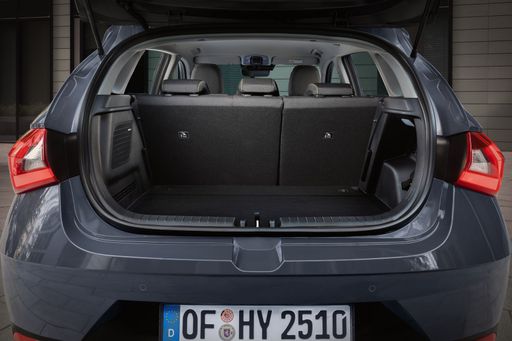 @ hyundai.news
@ hyundai.news
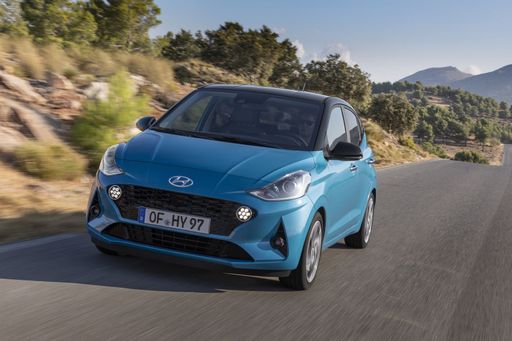 @ hyundai.news
@ hyundai.news
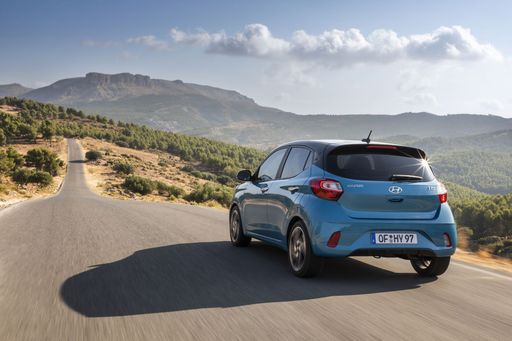 @ hyundai.news
@ hyundai.news
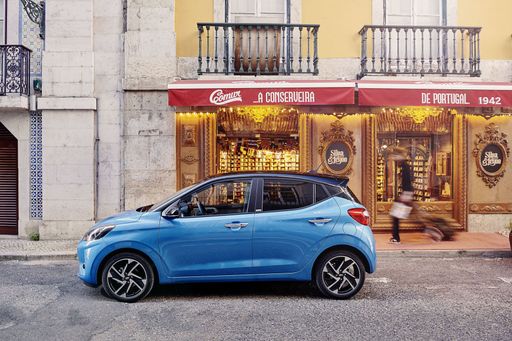 @ hyundai.news
@ hyundai.news
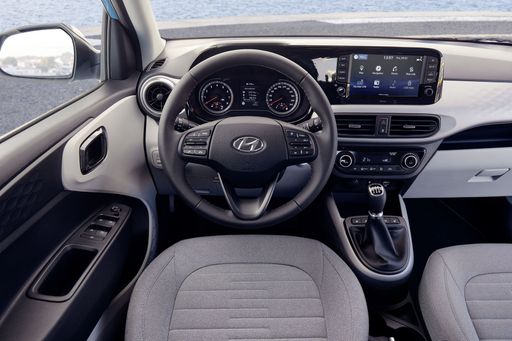 @ hyundai.news
@ hyundai.news
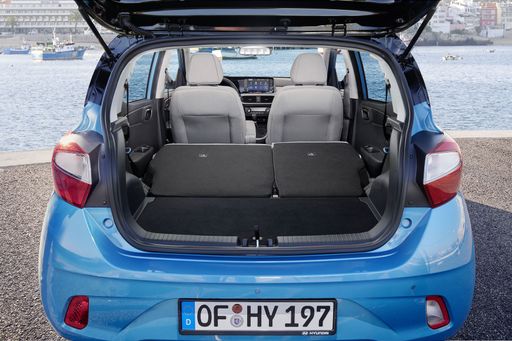 @ hyundai.news
@ hyundai.news

|

|
|
|
|
Costs and Consumption |
|
|---|---|
|
Price
about 18400 - 25500
$
|
Price
about 15700 - 20500
$
|
|
Consumption L/100km
5.1 - 5.3
L
|
Consumption L/100km
4.9 - 5.4
L
|
|
Consumption kWh/100km
-
|
Consumption kWh/100km
-
|
|
Electric Range
-
|
Electric Range
-
|
|
Battery Capacity
-
|
Battery Capacity
-
|
|
co2
117 - 120
g/km
|
co2
111 - 123
g/km
|
|
Fuel tank capacity
40
L
|
Fuel tank capacity
36
L
|
Dimensions and Body |
|
|
Body Type
Hatchback
|
Body Type
Hatchback
|
|
Seats
5
|
Seats
4 - 5
|
|
Doors
5
|
Doors
5
|
|
Curb weight
1088 - 1190
kg
|
Curb weight
996 - 1099
kg
|
|
Trunk capacity
352
L
|
Trunk capacity
252
L
|
|
Length
4065 - 4075
mm
|
Length
3670 - 3675
mm
|
|
Width
1775
mm
|
Width
1680
mm
|
|
Height
1450 - 1455
mm
|
Height
1480 - 1483
mm
|
|
Payload
450 - 472
kg
|
Payload
344 - 423
kg
|
Engine and Performance |
|
|
Engine Type
Petrol MHEV, Petrol
|
Engine Type
Petrol
|
|
Transmission
Automatic, Manuel
|
Transmission
Manuel, Automatic
|
|
Transmission Detail
Automat. Schaltgetriebe (Doppelkupplung), Manual Gearbox
|
Transmission Detail
Manual Gearbox, Automated Manual
|
|
Drive Type
Front-Wheel Drive
|
Drive Type
Front-Wheel Drive
|
|
Power HP
79 - 100
HP
|
Power HP
63 - 90
HP
|
|
Acceleration 0-100km/h
11.1 - 13.7
s
|
Acceleration 0-100km/h
11.4 - 18.4
s
|
|
Max Speed
166 - 183
km/h
|
Max Speed
143 - 175
km/h
|
|
Torque
113 - 200
Nm
|
Torque
93 - 172
Nm
|
|
Number of Cylinders
3 - 4
|
Number of Cylinders
3 - 4
|
|
Power kW
58 - 74
kW
|
Power kW
46 - 66
kW
|
|
Engine capacity
998 - 1197
cm3
|
Engine capacity
998 - 1197
cm3
|
|
Top speed
166 - 183
km/h
|
Top speed
143 - 175
km/h
|
General |
|
|
Model Year
2024
|
Model Year
2024
|
|
CO2 Efficiency Class
D
|
CO2 Efficiency Class
C, D
|
|
Brand
Hyundai
|
Brand
Hyundai
|
Hyundai i20
Introducing the Hyundai i20: A Blend of Style and Efficiency
The Hyundai i20 has been a favourite in the subcompact car segment, loved for its innovative features and reliable performance. In its latest versions, the i20 continues to impress with a perfect balance of aesthetics and functionality. Below, we dive into the technical details that make the Hyundai i20 a compelling choice for modern drivers.
Powertrain and Efficiency: Where Performance Meets Economy
The Hyundai i20 lineup offers an array of engine options, ranging from a 1.0-litre T-GDI petrol engine to the energetic 1.0-litre T-GDI 48V hybrid. These engines generate between 100 PS to a remarkable 204 PS in the N Performance variant. The incorporation of a mild-hybrid system improves fuel efficiency, with consumption as low as 5.1 L/100 km.
With both automatic and manual transmissions available, drivers can enjoy crisp gear shifts and a smooth driving experience. Front-wheel drive ensures nimble handling, making city and motorway drives equally enjoyable.
Design: Compact in Form, Grand in Appearance
The Hyundai i20 showcases a sleek hatchback design with dimensions that perfectly blend urban agility with interior spaciousness. Measuring between 4065 mm to 4075 mm in length, and with a width of 1775 mm, it offers a roomy cabin while maintaining a compact silhouette. The bold grille and stylish LED headlights contribute to its modern, athletic look.
Advanced Features and Technology
Innovation is at the heart of the Hyundai i20's appeal. It comes equipped with an impressive suite of technological features designed to enhance the driving experience. This includes a state-of-the-art infotainment system, which provides seamless connectivity through both Apple CarPlay and Android Auto.
The Hyundai SmartSense package is offered for peace of mind, with a suite of safety features like Forward Collision-Avoidance Assist and Lane Keeping Assist. These technologies ensure that you stay safe and in control, whether navigating city streets or hitting the open road.
Performance Variants: The Hyundai i20 N
For those who crave thrill, the i20 N variant doesn't disappoint. With 204 PS and a 6.2-second acceleration from 0 to 100 km/h, this hot hatch is designed for pure driving pleasure. It features an enhanced suspension setup and a range of performance-focused enhancements.
The i20 N embodies a spirit of adventure with its distinctive design cues and sporting credentials, perfect for enthusiasts who appreciate both performance and aesthetics.
Interior Comfort and Practicality
The interior of the Hyundai i20 is equally striking, with high-quality materials and a thoughtful layout that prioritises driver comfort and convenience. The cabin comfortably seats five passengers, while the boot offers a generous 352 litres of luggage space.
With an array of trim levels available, including N-Line and Prime, buyers can tailor the i20 to their tastes, ensuring they enjoy both luxury and practicality.
Final Thoughts: A Car Built for Modern Needs
The Hyundai i20 is more than just a car; it's a statement of style, efficiency, and innovation. Whether you're navigating busy urban streets or embarking on a road trip, the i20 is designed to meet the needs of contemporary drivers. With its range of engines, innovative features, and stylish design, the Hyundai i20 stands out in its class as a well-rounded and highly appealing choice.
Hyundai i10
Introduction to the Hyundai i10
The Hyundai i10 has consistently proven to be a dependable and stylish companion for urban driving. Known for its compact design and efficiency, this hatchback offers a perfect blend of modern aesthetics and practicality, making it a popular choice for city dwellers and small families alike.
Performance and Efficiency
The Hyundai i10 is available with both manual and automatic transmissions, catering to various driving preferences. Engine power ranges from 63 to 90 PS, providing a versatile driving experience for both novice and seasoned drivers. The fuel consumption varies between an impressive 4.9 to 5.4 litres per 100 kilometres, fitting for those looking to minimise fuel costs while also reducing their carbon footprint.
Engine and Transmission
Equipped with a choice of 1.0-litre or 1.2-litre engines, the i10 offers up to 172 Nm of torque, ensuring lively performance. The models feature front-wheel-drive configurations, allowing for smooth handling and reliable road performance. The car excels in city driving but is equally capable on longer journeys.
Interior and Comfort
Despite its compact size, the Hyundai i10 does not compromise on interior space and comfort. It accommodates four to five occupants comfortably, offering sufficient legroom and headroom. Its flexible seating arrangement and a 252-litre boot make it ideal for both quick trips and weekend getaways.
Safety and Technology
Safety remains a priority with Hyundai, and the i10 is no exception. It comes equipped with multiple airbags, stability control, and advanced braking systems. Technology-wise, the i10 features a user-friendly infotainment system with smartphone connectivity, ensuring a pleasant and connected drive.
Design and Style
The Hyundai i10’s design is both modern and sleek, making it stand out in the compact hatchback segment. With a length ranging from 3670 to 3675 mm, a width of 1680 mm, and a height of 1480 to 1483 mm, the i10 strikes a perfect balance between style and functionality.
Affordable Pricing and Value
The i10 is available in several trims including the Select, N Line, and Prime, among others, with prices ranging from €16,990 to €22,190. Considering its features and low running costs — with monthly expenses estimated between €694 to €793 — the Hyundai i10 offers substantial value for those seeking an economical yet stylish hatchback.
Conclusion
The Hyundai i10 combines efficiency, modern design, and practicality in a compact package. Whether you are seeking a reliable city car or an economical daily driver, the Hyundai i10 is a strong contender worth considering in the compact car market of 2024.
